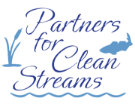
Did You Know? Clean Your Streams is the largest cleanup opportunity in Ohio that contributes marine debris data to the International Coastal Cleanup (ICC) database? Last month, Program Coordinator Kayla, was invited to Ocean Conservancy’s first ever International Coastal Cleanup Partner Fly-in to represent Partners for Clean Streams!
Some highlights from her trip include getting to meet an amazing group of ICC partners from across the country!! From Team Atlantic they had Blue Ocean Society, Save the Bay (Rhode Island), and the Rozalia Project. Team Great Lakes had Alliance for the Great Lakes, Milwaukee Riverkeeper and Partners for Clean Streams (PCS). Finally, Team Pacific brought along Save Our Shores (Santa Cruz) & Puget Soundkeeper. Kayla also enjoyed connecting with many wonderful staff at Ocean Conservancy!
On Capitol Hill, The OC and ICC Partner Team advocated for the co-sponsorship of the Farewell to Foam Act (S. 3440/H.R. 6654) and to fully fund the NOAA Marine Debris Program at $15 million for FY25 appropriations.
What is the Farewell to Foam Act?
According to the Ocean Conservancy, this act phases out and ultimately bans the sale or distribution of expanded polystyrene foam service-ware, loose fill (e.g., packing peanuts), and disposable foam coolers beginning in 2026.
- 12 states and D.C. have passed bans on plastic foam foodware, similar to the Farewell to Foam Act, since 2014. FYI- Ohio is not currently on this list!
- Maryland, the first state to pass a ban, saw a 65% decline in the amount of plastic foam foodware collected during the International Coastal Cleanup.
- If you are wondering how PCS plays into this… 48,977 foam foodware items such as foam cups, plates and take-away containers… 28,627 plastic and/or foam packaging and foam dock pieces… and 108,196 small foam pieces (<2.5 cm in size) have been cleaned up by Ohioans as of 2022!!
What about the NOAA Marine Debris Program Discussions?
In 2020, the bipartisan Save Our Seas (SOS) 2.0 Act, passed by Unanimous Consent. This act strengthened the pre-existing Marine Debris Program, increasing the authorized level to $15 million to help with research, prevention, removal, monitoring and detection, and response to marine debris. OC and ICC Partners requested the full $15 million for FY25 appropriations. They also requested a separate, specific budget line item to be added within the President’s yearly budget request and within NOAA’s yearly budget justifications at an amount equal to or greater than the authorized $15 million (Ocean Conservancy).
- $15 million towards NOAA’s Marine Debris Program will benefit a wide range of groups, just like PCS, to complete marine debris programs/projects across the nation. The longer we keep producing plastics, the more critical it becomes to support programs such as the Marine Debris Program (Ocean Conservancy).
Partners used this fly-in opportunity to share their stories and the impact each of their organizations have made both regionally and nationally with Congress staff and other partners. Kayla specifically, got the chance to share the story of PCS and share stories of our very own volunteers and local partners to the offices of Washington Senator Maria Cantwell (D-WA), Illinois Senator Tammy Duckworth (D-IL), Rep. Brad Schneider (D-IL-10), Rep. Jan Schakowsky (D-IL-09), Rep. Robin Kelly (D-IL-02), Ohio Senator Sherrod Brown (D-OH), Michigan Senator Gary Peters (D-MI), Wisconsin Rep. Mark Pocan (D-WI), and Rep. Gwen Moore (D-WI). She also got the chance to meet the two original co-sponsors of the Farewell to Foam Act, Congressman Lloyd Doggett (TX) & Senator Chris Van Hollen (MD)! The full team also got the opportunity to share individual stories to Nancy Wallace and how the NOAA Marine Debris Program has benefited ICC groups over the years!
Kayla is extremely grateful to Ocean Conservancy for inviting her out to represent Partners for Clean Streams, as well as to the PCS Staff and Board of Directors for assisting her in preparation of this endeavor. Partners for Clean Streams looks forward to continuing our efforts for clean, clear and safe water for all, especially through the contribution of marine debris data collection.
